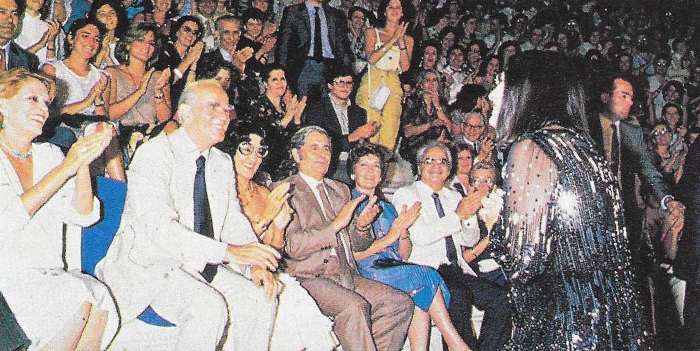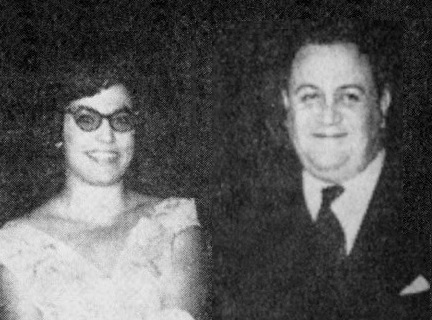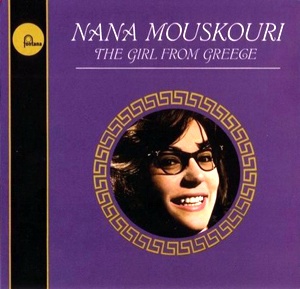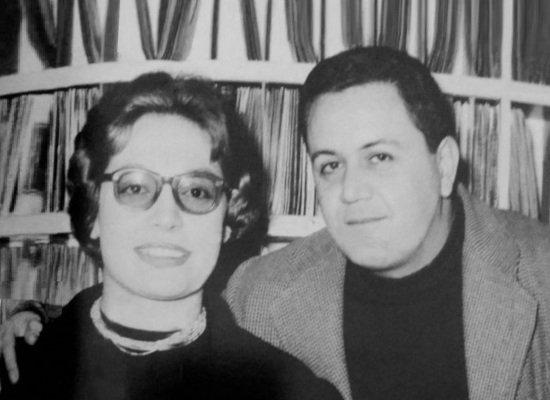
"Kapou iparhi i agapi mou"
Love, country and memories

There are days that confirm the destiny of an artist, whether it be a singer, an actor or a dancer. October 3, 1959 was one. That day the Greek Song Festival was held. Let us review the contest that revealed Nana to her first audience, Greece. Then, let us shine the spotlight on the winning song she released in four languages (in Greek, English, Dutch and French). And, to finish, why not pay tribute to its famous composer who launched Nana's career?
FIRST GREEK SONG FESTIVAL
Until then, Nana was mainly known in the Greek capital and to those who frequented the clubs where she performed. Television did not yet exist, but we heard her songs regularly on the radio. She had two EPs and five singles to her credit with the firm Fidelity.
As it was raining, the contest took place in the grand salon of the King George Hotel in Athens. There, about twenty young performers had gathered to sing in front of a jury. It was a unique opportunity for them to be heard on the radio and perhaps to launch their careers. The composer Manos Hadjidakis had decided to present Nana with a song for which he had written the music and the lyrics. Under his musical direction, she performed it for the first time in public. The title: "Kapou iparhi i agapi mou" (My Love is somewhere). With this romance, Nana won the first prize and within three months became the most popular singer in her country. We therefore witnessed a marriage of Nana with her compatriots. And to her great joy, her father finally forgave her for not having completed her training in classical singing at the Conservatory.
|
 |
KAPOU IPARHI I AGAPI MOU
In the original language, Nana says: "When the boys whistle or say goodnight to me, I have nothing to say. I don't know where or who, but somewhere there is my Love. And if I find him, I swear I'll write it down, bring him back to the stars". Hadjidakis was very demanding and ensured that his arrangements were followed to the letter. Most of the time, he made his recordings with his big band in the studio. This time, he accompanied Nana on the piano with a percussionist and a xylophonist. And he allowed her to sing as loud as she wanted by pronouncing: "St'orkizomé" (I swear). This, simply to convince and move more.
|
The Greeks have long identified her with this song. Moreover, it was the favourite of former President Constantin Karamanlis. In her early days, when he attended her singing performances, he asked her to sing it. That is why, in 1984, at the Odeon of Herodes Atticus, Nana went down from the stage to sing it before him. Her compatriots have not forgotten it and on occasion, television rebroadcasts her performance of the time from the film "To rantevou tis Kerkyra" (Rendezvous in Corfu). If over the years, Nana has mainly performed it in her country, her 1963 re-recording has been marketed worldwide. |
SOMEONE The theme in English follows the one in Greek. It comes down to: That's my Love I'm looking for, someone to hold me tight. And if I find it, I will know because my heart will tell me. Piano, xylophone, drums and trumpet create the musical atmosphere. The recording took place in 1962 in New York with the orchestra of Shelby Singleton. This one was made for an album of Greek songs translated in English. It remained unreleased until 2004. In her English integral, it was included on the CD "The Girl from Greece".
|
 |
|
GRIEKENLAND Released in 1966, "Griekenland" is one of her seven songs in Dutch. As it is a language that Nana does not speak, she had to be trained to pronounce the lyrics properly. These have to do with her attachment to her country: "Wherever I am in the world, I am and always will be your child. I love you with all my heart and soul. My Greece, I will never forget you". On the day of the recording, The Athenians joined Nana with their instruments and voice. In 2002, the song reappeared with other Dutch titles on the double CD "The Singles+". |
LES BONS SOUVENIRS In 1972, the French version appeared in her album "Une voix qui vient du cœur". Pierre Delanoë's text, totally different from the original, refers to her country, to her friends of yesteryear. With emotion, Nana says that she forgot the days of miseries and the days without joy. Her memory is full of good souvenirs. And, when she is nostalgic, these ones reappear. The recording is quite successful and nothing suggests that it is an adaptation. A voice and a guitar are enough to make us dream. In 2020, this song will be used as the title for a compilation of Greek songs performed in French. |
 |
IN GERMAN?
Since her first German records were the best-selling ones and they were mostly translations of Greek songs, we can think that Nana has recorded it in that language. Maybe one day we will see it appear among her many unreleased tracks?
THE COMPOSER We have often talked about Manos Hadjidakis, the famous composer of "Never on Sunday" and the first supporter of Nana. Their first meeting dates back to 1958. As he lived in the neighborhood of Pangrati like Nana, he said he heard her singing one day under his window. Charmed by her voice, he invited her to his home to offer her songs. For him, there was no other singer in Greece who could interpret them better than her. Thanks to him, her repertoire has been enriched and she began her real career. |
 |
THIS SOMEONE
"Kapou iparhi i agapi mou", one of Nana's first songs, represents the beginning of something and evokes the future with hope. It was composed according to her age. At that time, in Greece, every young girl dreamed of meeting the man of her life and getting married in a white dress. But today, knowing Nana's journey, we can interpret it as the desire to be loved and the conviction that this will come true. This someone could simply be the public.